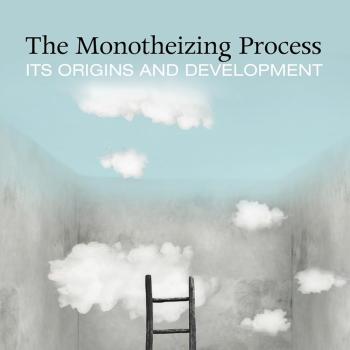The last book in the Bible begins, “The revelation of Jesus Christ, which God gave him” (Rev 1.1 NRSV). The word “God” always refers to “the Father” in the book of Revelation. Thus, there is no room in this book for the unbiblical doctrine of the Trinity that church fathers wrongly formulated during the fourth century, pronouncing that if anyone denies this teaching he or she is not a Christian. That is flat wrong!
As I have said before on this blog, I grew up in Seattle, Washington, going to Sunday school in a Nazarene church and became a born-again Christian there when I was thirteen years old. I had never heard of the doctrine of the Trinity until I went to college in Houston, Texas, and was taught it in a Bible church. Thus, I became a Christian by believing Jesus died for my sins on the cross, not by believing in the Trinity. Yet I did thereafter believe in the church doctrine of the Trinity for twenty-two years until I discovered from my own research that it is not in Bible.
What is the institutional church doctrine of the Trinity? It is that God is one essence consisting of three c0-equal and c0-eternal persons: the Father, the Son Jesus Christ, and the Holy Spirit. Some trinitarian scholars equate the words “essence” and “being” and thereby differentiate the triune God as a being from these three individual persons who they do not regard as beings. Trinitarians claim that they are monotheistic, meaning they believe in the existence of only one god/God. But I think trinitarianism looks like belief in three gods, even though trinitarians deny this.
Trinitarianism has never escaped the charge of belief in three gods/Gods. The book of Revelation, like other New Testament (NT) literature, says God the Father and Jesus sit together on the Father’s throne in heaven. And since trinitarianism says the Father and Jesus are two separate persons, and each of these two persons is God, an unbiased person views that as two Gods sitting together on the Father’s throne. There is no way you can compute this, slice it, or dice it any other way! And when you figure in the Holy Spirit, that makes three Gods. Yet the book of Revelation never says anything about the Holy Spirit sitting on that heavenly throne with God the Father and Jesus his Son.
The Bible declares repeatedly that there is only one true and living God (e.g., John 17.3), who is the God of Israel, the God of the Bible, the God of creation. No book or letter in the NT says Jesus has a God, who must be this one God, more than does the book of Revelation. It starts out by saying of Jesus, “To him who loves us and freed us from our sins by his blood, and made us to be a kingdom, priests serving his God and Father” (Rev 1.5-6). So, according this book, Jesus has a God, and this God is “the Father.” Even Jesus himself says in this book:
- “I have not found your works perfect in the sight of my God” (Rev 3.2).
- “If you conquer, I will make you a pillar in the temple of my God; you will never go out of it. I will write on you the name of my God, and the name of the city of my God, the new Jerusalem that comes down from my God our of heaven” (Rev 3.12). So, 4x this verse says “my God.”
If Jesus has a God, and that God he calls “Father,” and there is only one God, then Jesus cannot also be God since that makes two Gods. Trinitarians constantly ignore this troubling element of their doctrine. In fact, when church fathers first began to say Jesus is God, in the second century, they encountered opposition from people who accused them of believing in two Gods. This criticism came from Jews, pagans, and some Christians. Among Christians, it was especially Jewish Christians who made this allegation since, throughout all of the early centuries of church history, all of the so-called “church fathers” were Gentiles. And I believe many of them decided on this Trinitarian teaching because they were influenced by Greek philosophy.
What do God’s angels say about this matter? It is no different in the book of Revelation for the angels of God in heaven. They repeatedly identify the “one who sits on the throne,” who is the Father, as “our God.” They say of him:
- “You are worthy, our Lord and God, to receive glory and honor and power” (Rev 4.11).
- “you [Jesus] have made them to be a kingdom and priests serving our God” (Rev 5.10).
- “Do not damage the earth … until we have marked the servants of our God” (Rev 7.3).
- “Salvation belongs to our God who is seated on the throne, and to the Lamb” (Rev 7.10).
- “Blessing and glory and wisdom … be to our God forever and ever!” (Rev 7.12).
- “Now have come the salvation … of our God and the authority of his Messiah” (Rev 12.10).
- Satan “accuses them [God’s people] day and night before our God” (Rev 12.10).
- “Hallelujah! Salvation and glory and power to our God” (Rev 19.1).
- “Praise our God all you servants, and all who fear him, small and great” (Rev 19.5).
- “Hallelujah! For the Lord our God the Almighty reigns” (Rev 19.6).
So, ten times in the book of Revelation the angels in heaven identify the Father as their God, and they never say this of Jesus. Notice that in Rev 12.10, angels also differentiate their “God” from “his Messiah.” Thus, the angels clearly have one God, who is the Father, so that Jesus the Messiah is not their God.
The remainder of the book of Revelation is primarily centered on God who orchestrates future events to occur both in heaven and on earth. Jesus is mentioned too, but God is the main protagonist; yet God accomplishes his purposes mostly through Jesus. This God is repeatedly described as sitting upon a throne in heaven. In one occurrence the author, John (Rev 1.1), reveals concerning God the Father, “At once I was in the spirit, and there in heaven stood a throne, with one seated on the throne!” (Rev 4.1).
Furthermore, in this book it is the Father, and never Jesus, who is called “the God of heaven” (Rev 11.13; 16.11). And when the author John bows down to an angel speaking to him, that angel exclaims, “You must not do that! I am a fellow servant with you and your comrades who hold the testimony of Jesus. Worship God!” (Rev 19.10). And the same thing happens again, in Rev 22.8-9. Why would the angel say that and not include Jesus no matter whether or not Jesus is God since he sits on the throne with God? And John says the angels “fell on their faces before the throne and worshiped God,” without including Jesus (Rev 7.12). Also in heaven, “the twenty-four elders and the four living creatures fell down and worshiped God who is seated on the throne, saying, ‘Amen. Hallelujah!'” (Rev 19.4). Again, no mention of Jesus as an object of their worship. However, at another time all of heaven sings and says, “Worthy is the Lamb [Jesus] that was slaughtered to receive power . . . To the one seated on the throne and to the Lamb be blessing and honor and glory and might forever and ever!” (Rev 5.13). Are they worshiping Jesus along with God? It’s hard to tell.
Jesus is worthy because he conquered, and that is one of the most important messages of the book of Revelation. Jesus conquered by submitting to being “slaughtered,” that is, crucified. Because he conquered, Jesus is rewarded, first of all by being resurrected from the dead, then lifted up to heaven, and exalted there by sitting down with the Father on his throne. Jesus said, “I myself conquered and sat down with my Father on his throne” (Rev 3.21). The Greek word nikao that is translated “conquer(ed)” in this text, and many others in Revelation about Jesus, is sometimes translated “overcome.”
But if Jesus was and is God, how could he have conquered? Conquer or overcome what? He conquered or overcame sin, Satan, all temptation, even Satan’s temptations of him, and the desires of the flesh, which include avoiding death at all costs. Jesus conquered mostly by submitting to God’s plan for him to go to the cross to die for our sins. But God cannot conquer sin and temptation. Jesus’ brother James writes, “God cannot be tempted by evil” (James 1.13). And how can Jesus be rewarded for this if he is God? Can God be rewarded? God can be praised and blessed, but not rewarded. Rewarding is done by an authority or entity that is greater than the one rewarded.
Jesus is presented in the book of Revelation as the model conquerer or overcomer, and he appeals to us who belong to him to follow him in doing likewise. Many Christians have not grasped this truth since they have reasoned that it was not difficult for Jesus to overcome because he was God. I think that is the most damaging thing about the doctrine of the Trinity and it classical, so-called incarnation, which means Jesus is God.
For example, Jesus says to each of the seven churches, “to the one who conquers” he will give a reward (Rev 2.7, 11, 17, 26, 28; 3.5, 12, 21; 21.7). He also says, “To the one who conquers I will give a place with me on my throne, just as I myself conquered and sat down with my Father on his throne” (Rev 3.21). The book of Revelation therefore repeatedly presents Jesus as our model for conquering/overcoming.
Now, Jesus’ own throne is not the throne he sits on in heaven. That is God’s throne. Instead, Jesus’ throne will be here on earth at Jerusalem. It is “the throne of David” which he will inherit from his ancestor King David.
How do we follow Jesus in conquering or overcoming? First of all, we should ask him for the strength to do so. The author of the book of Hebrews says of Jesus, “he had to become like his brothers and sisters in every respect, so that he might be a merciful and faithful high priest in the service of God, to make a sacrifice of atonement for the sins of the people. Because he himself was tested by what he suffered, he is able to help those who are being tested” (Heb 2.17-18).
So, Jesus could not have been our model unless he was fully human, and if he was God he was not “like his brothers and sisters in every respect.” The author of Hebrews adds, “Let us therefore approach the throne of grace with boldness, so that we may receive mercy and find grace to help in time of need” (Heb 4.16). So, let us Christians ask Jesus for help in following him in order to become conquerers. And may we appreciate even more Jesus’ overcoming of sin as a fully human being to become our unblemished sacrifice for sin as the Lamb of God.
















